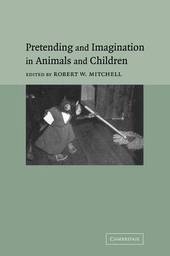
|
Pretending and Imagination in Animals and Children
Paperback / softback
Main Details
| Title |
Pretending and Imagination in Animals and Children
|
| Authors and Contributors |
Edited by Robert W. Mitchell
|
| Physical Properties |
| Format:Paperback / softback | | Pages:390 | | Dimensions(mm): Height 229,Width 152 |
|
| Category/Genre | Animal behaviour |
|---|
| ISBN/Barcode |
9780521283328
|
| Classifications | Dewey:155.418 |
|---|
| Audience | | Professional & Vocational | |
|---|
| Illustrations |
Worked examples or Exercises
|
|
Publishing Details |
| Publisher |
Cambridge University Press
|
| Imprint |
Cambridge University Press
|
| Publication Date |
16 June 2011 |
| Publication Country |
United Kingdom
|
Description
It is well known that children's activities are full of pretending and imagination, but it is less appreciated that animals can also show similar activities. Originally published in 2002, this book focuses on comparing and contrasting children's and animals' pretenses and imaginative activities. In the text, overviews of research present conflicting interpretations of children's understanding of the psychology of pretense, and describe sociocultural factors which influence children's pretenses. Studies of nonhuman primates provide examples of their pretenses and other simulative activities, explore their representational and imaginative capacities and compare their skills with children. Although the psychological requirements for pretending are controversial, evidence presented in this volume suggests that great apes and even monkeys may share capacities for imagination with children, and that children's early pretenses may be less psychological than they appear.
ReviewsReview of the hardback: 'This is a stimulating book. You will find (i) essays of straightforward data whose relation to the larger issues raised seems unclear, (ii) ideas that stimulate your own 'imagination', (iii) detailed statements by some of the better known human researchers of chimpanzees and gorillas, and (iv) how the clever methodologies used to study human children can be appropriated for work with non-human primates.' Ethology
|